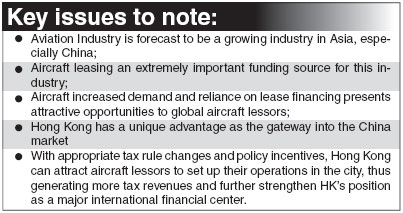Aviation sector should be part of the city's transport hub drive
Updated: 2012-09-05 06:47
By Rex Ho(HK Edition)
|
|||||||||

Chief Executive C Y Leung told the Financial Times recently that the Hong Kong government will do more to help local industries by using some of the city's fiscal reserves which currently stands at well over HK$600 billion ($77.36 billion). He also mentioned Singapore's use of tax incentives to shore up its shipping industry, and set his sights on overtaking London as the center for shipping services.
If what the Chief Executive actually meant was to further strengthen Hong Kong's position as the leading transportation hub in Asia, then the government must include the aviation industry into its development plan.
Looking at Asia's aviation sector, it is forecast that there would be a strong demand for new aircraft through 2030, predominantly driven by the emerging markets. According to estimates, 40 percent of the world's commercial fleet will be based in Asia Pacific by 2030, and China alone will be operating over 5,500 aircraft. As a result, there would be significant needs for aircraft financing in order to meet the rapidly growing aircraft demand. Amongst the various types of aircraft financing, lease financing has grown substantially over the years. According to Boeing, approximately 40 percent of the global air fleet today are financed with leases, which is compared to less than 1 percent 40 years ago.
Such increase in aircraft demand and reliance on lease financing has presented an attractive opportunity for global aircraft lessors to boost their presence in China in order to tap into the world's fastest growing aviation market. As a result, many aircraft lessors are considering developing an Asian aerospace hub, outside the traditional jurisdictions like Ireland and the US to capture this potentially lucrative opportunity.
Critics have often indicated that the options for global aircraft lessors to set up their Asian operations include Hong Kong, Singapore and China. Indeed, Singapore has taken a major step to provide a favorable tax regime and policy incentives for aircraft lessors to operate in the Lion Republic. We are aware that a number of global aircraft lessors have been considering setting up their Asian operations in Singapore, which is clearly working to the detriment of Hong Kong.
For Hong Kong to compete in this arena, it is important that the government leverages on the city's existing advantages of being the gateway into China, its mature financial system, stable political environment and well-developed legal system. However, what is paramount is that the government should revisit the existing tax rules and policy incentives to improve the overall business environment for aircraft lessors intending to operate in Hong Kong. This would not only help Hong Kong maintain its competitiveness as Asia's key transportation hub, but also further strengthen its position as a major international financial center.
Rex Ho and co-author Clarence Leung are both tax expert at PwC. The views expressed here are entirely their own.

(HK Edition 09/05/2012 page2)